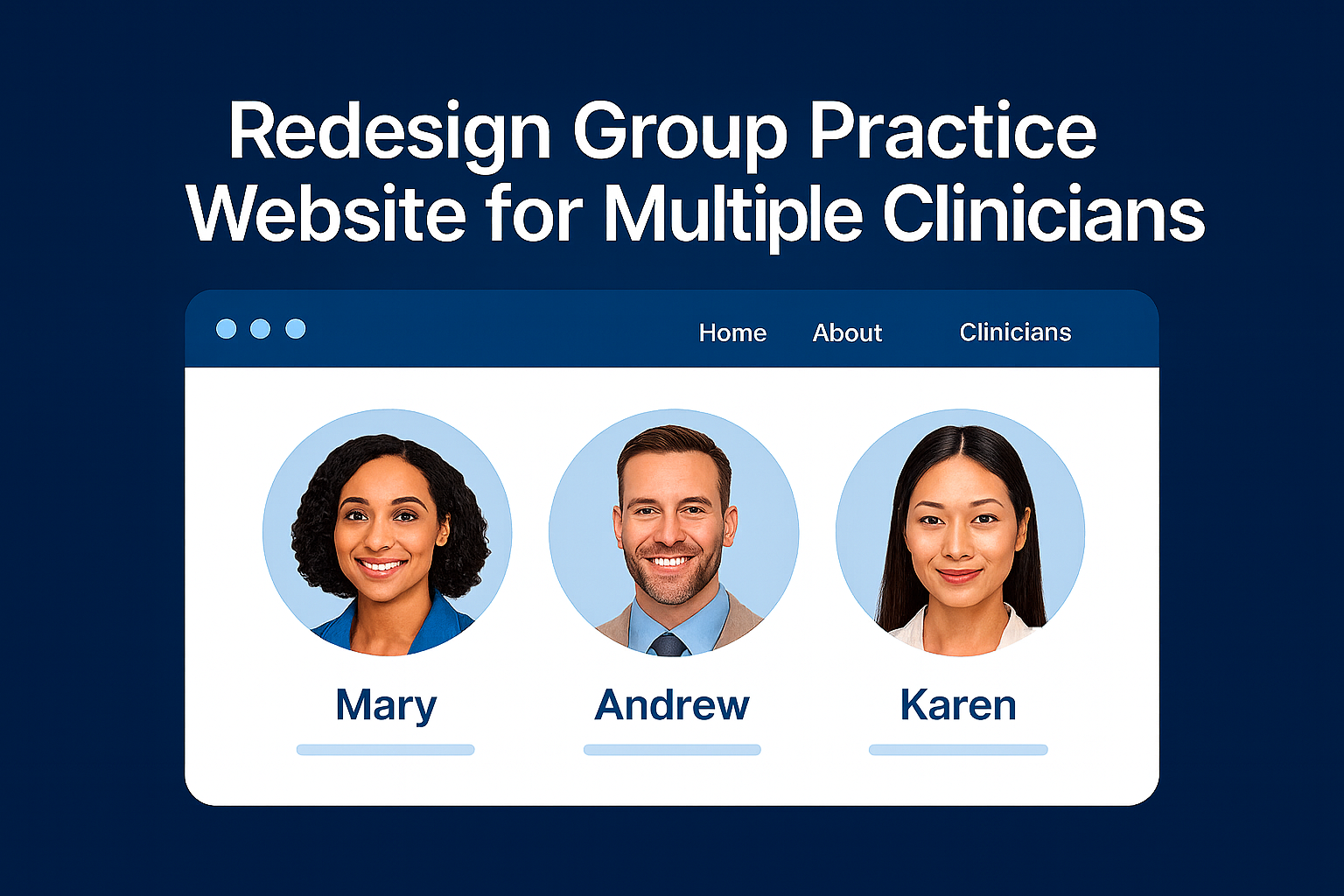How a fast, mobile-friendly website can boost your practice’s growth is a critical topic for therapists aiming to thrive in today’s digital landscape. With clients increasingly relying on their smartphones to find mental health services, a website that loads quickly and performs seamlessly on mobile devices is no longer optional—it’s essential. A fast, mobile-friendly website not only improves user experience but also enhances your visibility on search engines, attracts more clients, and supports the overall growth of your practice. This guide from Mental Health IT Solutions (MHIS) explores how a fast, mobile-friendly website can boost your practice’s growth, offering practical strategies to optimize your site and achieve lasting success.
Why Speed and Mobile-Friendliness Matter for Your Practice
In the mental health field, where first impressions and accessibility are key, your website serves as a digital gateway to your services. A slow or poorly optimized site can frustrate potential clients, causing them to leave before they even contact you. Google reports that 53% of mobile users abandon a site that takes longer than three seconds to load, and with mobile devices accounting for a significant portion of web traffic, a mobile-friendly design is crucial. Additionally, Google prioritizes fast, mobile-friendly websites in its search rankings, meaning optimization directly impacts your visibility. By understanding how a fast, mobile-friendly website can boost your practice’s growth, you can create a digital presence that attracts, engages, and converts clients effectively. Let’s dive into the key strategies to make this happen.
5 Ways a Fast, Mobile-Friendly Website Boosts Your Practice’s Growth
1. Improves User Experience and Client Retention
A fast, mobile-friendly website ensures a seamless experience for clients, encouraging them to stay on your site, explore your services, and take action, such as booking a session.
- Quick Load Times: A site that loads in under three seconds reduces bounce rates, keeping potential clients engaged.
- Easy Navigation: A mobile-friendly design with intuitive menus and clickable buttons makes it simple for clients to find what they need, like your contact page or scheduling tool.
- Positive First Impression: A smooth, professional mobile experience builds trust, increasing the likelihood that clients will return or recommend your services.
2. Enhances Search Engine Rankings
Google prioritizes fast, mobile-friendly websites in its search rankings, which directly impacts your visibility to potential clients searching for mental health services.
- Mobile-First Indexing: Google primarily uses the mobile version of your site for indexing and ranking, so a mobile-friendly design is essential for SEO.
- Page Speed as a Ranking Factor: Faster load times improve your site’s ranking, helping you appear higher in search results for terms like “therapist near me.”
- Local SEO Benefits: A mobile-friendly site with location-specific keywords can help you rank in Google’s Local Pack, attracting nearby clients.
For more on SEO, explore Local SEO for Mental Health Therapists.
3. Attracts More Clients Through Mobile Searches
Many clients search for therapists on their smartphones, often while on the go. A fast, mobile-friendly website ensures you capture these potential clients at the moment they’re looking for help.
- Click-to-Call Features: Add a clickable phone number so mobile users can contact you directly with one tap.
- Location Pages: Include a mobile-optimized “Contact” page with your address and a map embed to help local clients find you.
- Voice Search Optimization: Optimize for voice searches like “therapist near me” by using conversational keywords and answering common questions in your content.
4. Supports Teletherapy and Online Engagement
A fast, mobile-friendly website can seamlessly integrate teletherapy and other online features, making it easier for clients to engage with your services remotely, which can expand your client base.
- Teletherapy Access: Include a “Start Teletherapy” button that works smoothly on mobile, linking to a HIPAA-compliant platform for virtual sessions.
- Online Scheduling: Use a mobile-friendly scheduling tool so clients can book appointments on the go without frustration.
- Engaging Content: Share mobile-optimized blog posts or resources, like “5 Tips for Managing Anxiety,” to keep clients engaged and encourage repeat visits.
For more on teletherapy, see Teletherapy Platform Development.
5. Builds Trust and Professional Credibility
A fast, mobile-friendly website signals professionalism and reliability, which are crucial for building trust with potential clients in the mental health field.
- Modern Design: A mobile-friendly site with a clean, calming design (e.g., soft colors and simple layouts) creates a welcoming first impression.
- Secure Experience: Ensure your site is secure with an SSL certificate (look for “https” in the URL) and HIPAA-compliant features, reassuring clients their data is safe.
- Social Proof: Display testimonials and credentials in a mobile-friendly format to establish credibility and encourage clients to reach out.
For more on building trust, read Psychologist Branding Solutions.
How to Optimize Your Website for Speed and Mobile-Friendliness
1. Use a Responsive Design
Choose a responsive website design that automatically adjusts to different screen sizes, ensuring a seamless experience on smartphones, tablets, and desktops.
2. Optimize Page Speed
- Compress Images: Use tools like TinyPNG to reduce image file sizes without sacrificing quality.
- Minimize Code: Remove unnecessary scripts and CSS to streamline your site’s performance.
- Leverage Caching: Enable browser caching to store static files, reducing load times for returning visitors.
3. Test Your Site’s Performance
- Google PageSpeed Insights: Analyze your site’s speed and get recommendations for improvement.
- Google’s Mobile-Friendly Test: Check how well your site performs on mobile devices and identify issues to fix.
- Real User Testing: Ask a friend or colleague to navigate your site on their phone and provide feedback on the experience.
4. Prioritize Key Mobile Features
- Simplified Navigation: Use a hamburger menu to keep navigation clean and accessible on smaller screens.
- Large Buttons: Ensure buttons like “Book Now” are large and easy to tap on mobile devices.
- Readable Text: Use legible font sizes (at least 16px) and high-contrast colors for readability.
5. Ensure HIPAA Compliance
A fast, mobile-friendly website must also be secure to protect client data. Use encrypted contact forms, host your site on a HIPAA-compliant server, and display security badges to build trust.
For more on compliance, check out HIPAA-Compliant Website Development.
Benefits of a Fast, Mobile-Friendly Website for Your Practice
- Increased Client Inquiries: A better user experience and higher search rankings lead to more website traffic and client inquiries.
- Expanded Reach: Mobile optimization ensures you capture clients searching on their phones, including those seeking teletherapy.
- Improved Retention: A seamless experience encourages clients to return and engage with your services, such as booking follow-up sessions.
- Cost-Effective Growth: Optimizing your website is a cost-effective way to grow your practice compared to paid advertising, offering long-term results.
Common Mistakes to Avoid
- Ignoring Speed: A slow site drives clients away and hurts your SEO. Regularly test and optimize your site’s performance.
- Overloading with Features: Too many elements, like large images or pop-ups, can slow down your site and frustrate mobile users.
- Neglecting Mobile Testing: Don’t assume your site works well on mobile—test it on multiple devices to ensure compatibility.
- Skipping Security: A fast, mobile-friendly site must also be secure. Failing to prioritize HIPAA compliance can erode client trust.
The Long-Term Impact on Your Practice’s Growth
Understanding how a fast, mobile-friendly website can boost your practice’s growth offers lasting benefits. A well-optimized site increases your visibility, attracting more clients through search engines and mobile searches. It also builds trust and credibility, encouraging clients to choose your services and return for ongoing care. Additionally, a mobile-friendly website supports teletherapy and online engagement, helping you reach a broader audience and grow sustainably. By investing in speed and mobile optimization, you can create a digital presence that drives growth and sets your practice up for long-term success.
Final Thoughts
How a fast, mobile-friendly website can boost your practice’s growth is a powerful strategy for therapists looking to thrive in a digital world. By improving user experience, enhancing search rankings, and supporting teletherapy, you can attract and retain more clients while building a professional online presence. Partnering with Mental Health IT Solutions can help you optimize your website for success. Ready to grow your practice? Visit Mental Health Website Development for expert support in building a client-attracting website.







